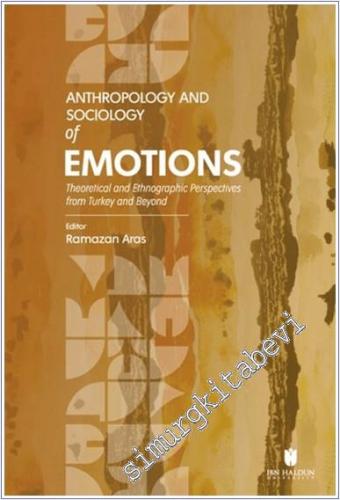#smrgKİTABEVİ Anthropology and Sociology of Emotions : Theoretical and Ethnographic Perspectives from Turkey and Beyond - 2024

This collection of works is derived from the workshop titled “Transitions, Precarities, and Politics: Studying Emotions and Affect in Turkey” organized by the editor at Ibn Haldun University on May 5-6, 2023. Following the same pattern of thought and by going beyond the Eurocentric, secular, and positivist perspectives on emotions, Anthropology and Sociology of Emotions: Theoretical and Ethnographic Perspectives from Turkey and Beyond aims to provide novel theoretical and ethnographic studies and discussions on emotions and what emotions do in the context of diverse issues and some current crises in Turkey.
Throughout the book, authors dealt with challenging questions going beyond Eurocentric, orientalist and positivist frameworks: How can we redefine emotions in relation to Islamic sources and Muslim traditions? How are emotions constructed and shaped by social, cultural, political, religious, and economic factors across different time periods and places? How do emotions play a role in collective actions? In today's digital world, how can we talk about emotions? What are the roles of religious rituals in shaping emotional experiences, and how are emotions socially constructed, maintained, and regulated within religious communities? To what extent does the emphasis on rationality and control in modernity lead to the suppression or reconfiguration of certain emotions?
This collection of works is derived from the workshop titled “Transitions, Precarities, and Politics: Studying Emotions and Affect in Turkey” organized by the editor at Ibn Haldun University on May 5-6, 2023. Following the same pattern of thought and by going beyond the Eurocentric, secular, and positivist perspectives on emotions, Anthropology and Sociology of Emotions: Theoretical and Ethnographic Perspectives from Turkey and Beyond aims to provide novel theoretical and ethnographic studies and discussions on emotions and what emotions do in the context of diverse issues and some current crises in Turkey.
Throughout the book, authors dealt with challenging questions going beyond Eurocentric, orientalist and positivist frameworks: How can we redefine emotions in relation to Islamic sources and Muslim traditions? How are emotions constructed and shaped by social, cultural, political, religious, and economic factors across different time periods and places? How do emotions play a role in collective actions? In today's digital world, how can we talk about emotions? What are the roles of religious rituals in shaping emotional experiences, and how are emotions socially constructed, maintained, and regulated within religious communities? To what extent does the emphasis on rationality and control in modernity lead to the suppression or reconfiguration of certain emotions?






















